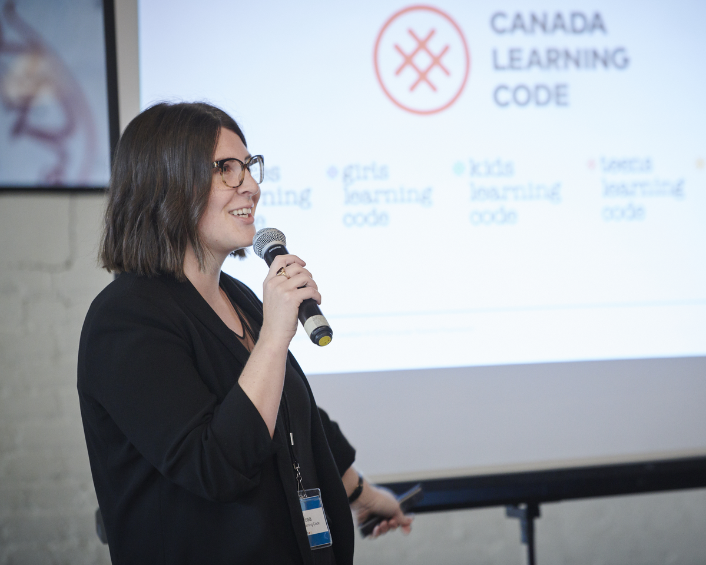Reflecting on your keynote speech at Smashing Barriers, how does Canada’s digital literacy look today, versus when you first started the initiative of Canada Learning Code, and even compared to when you were a child? What’s it like getting to see the tremendous impact your now national organization has had on this transformation?
So much has changed. A decade ago, when we were in classrooms, we’d ask learners what “code” meant, and many didn’t even make the connection to computers — let alone having coded themselves. Now when we visit classrooms across the country, most students have coded! So, I’m super encouraged by that, but we also know technology never stops advancing and advances so quickly. I think we’re in a time where we can’t take our foot off the gas and we need to keep supporting people —youth and adults — to be able to build, work and live with technology.
In your opinion, why is it crucial for kids, young people, and professionals in various capacities to learn coding skills in today’s digital age?
I get this question a lot, especially in the last year and a half with the rise of Chat GPT and AI that will code for you. For me, it really comes down to this idea that it’s important to understand the way things around us work, and we’d be hard pressed to go through our day without technology. Just like we would teach children science not because we want all children to be scientists, but because it’s important to understand why your window fogs up while you’re driving. In the context of computer science and coding, it’s simply important to understand how the technology we sit in front of everyday works. It helps us better understand the world around us and the specific way of thinking that talking to computers requires. I think it’s fundamental, in the same way math, language or science is.
Can you share any specific gaps or challenges you observed in access to digital literacy and coding education that motivated you to dedicate your career to addressing them?
I think the biggest gap or challenge that was really the inspiration for Ladies Learning Code was the stereotype that coding, or people who code, are doing this alone in their basement, isolated – which doesn’t appeal to a lot of people. Yet, most technology roles are actually very collaborative and creative! Being able to offer training that is social and collaborative resonates with a variety of learners, so taking this angle was really important to help more people see this as something fun and approachable to try.
During your keynote, you touched on your early experiences with coding and tinkering with computer technology. How have those early experiences shaped your approach to promoting coding education for all?
Oh, I think my early experience having taught myself how to code and then not being encouraged to pursue it any further by either teachers or my family, as well as not having anyone around me who worked in technology is absolutely core to how I think about this work. It’s so important we not only provide people with the skills to build with technology but also the confidence to do so! And a lot of that comes from seeing people like you reflected in the industry and having mentors or support around you.
In your view, how can organizations and educational institutions collaborate to bridge the gap in digital literacy and ensure that no one is left behind in the digital revolution?
I think partnership between industry, academia, non-profits, and the education system is really important. There’s a saying that the pipeline for women in tech is leaky at many places. It’s this idea that if we only focus on, let’s say teaching more girls to code, and then they end up in workplaces that haven’t been intentional in creating welcoming and inclusive spaces, then women will opt out later in their journey. We need an entire ecosystem approach to ensure the tech industry is a sector everyone can thrive in.
As a leader in the tech education space, what advice would you give to individuals who may feel intimidated or unsure about diving into coding and digital skills training?
Just try it, please! There are lots of both online and in-person experiences and many that are social and collaborative. Or, if you’d prefer to learn at your own pace, there’s that too. Like learning any new language, to be truly proficient takes energy, time, practice, and patience; to get started learning a few words or phrases it’s accessible. The same goes with coding or digital skills. Plus, once you’ve tried and built something, I think you’ll get hooked!
What kind of ideal education landscape would you envision for Canadian society today, the one your daughter is growing up in?
I’d love to see personalized education that is driven by the learner first and foremost — I think this is where technology is going to be able to support us a lot. Personalized learning is key because it allows everyone to take their own path and learn on their own timelines. There’s a lot of great people and organizations working on this and I’m really optimistic about what education will look like in even just a few years from now.
How do you balance the demands of being a Founder with your personal life, especially being a mom?
Early on having my daughter, I realized that I can’t do everything at once and that for me, balance probably isn’t what I should strive for. Now, I’m a big believer in single-tasking. When it’s time to work, I work and when it’s time to play with my daughter, I try to just be present with her. For me it’s less about balance and more about being present in one thing at a time. Day by day.
How did you navigate the early stages of uncertainty and doubt in your entrepreneurial journey?
It is so important to have people around you that can support you during those lows because as an entrepreneur the highs are really high, and the lows are really low. I was really lucky that I started Ladies Learning Code with Co-Founders — three other incredible women that I could always lean on. If you don’t have a founding team, then build your personal and professional circle. I’ve also found that having people who are in the same stage as you can be really valuable because they have recent and relatable experiences to share. Most importantly, surrounding yourself with other Founders helps you realize you’re not alone in this adventure.
What single piece of advice would you give to female entrepreneurs and innovators in tech who are thinking about starting their own company or even just have a powerful idea but might be afraid/hesitant to?
Just do it. I know it’s not that simple because it takes a lot to get an idea from nothing to something, but if you have an idea and you’re excited and passionate about it, I encourage you to just get started. I’m a big believer in “quick wins” and trying to figure out what the smallest step you can take towards your idea to get momentum is. Step after step, small win after small win, you’ll be full-steam ahead and probably never look back. So just start, small, but start!

